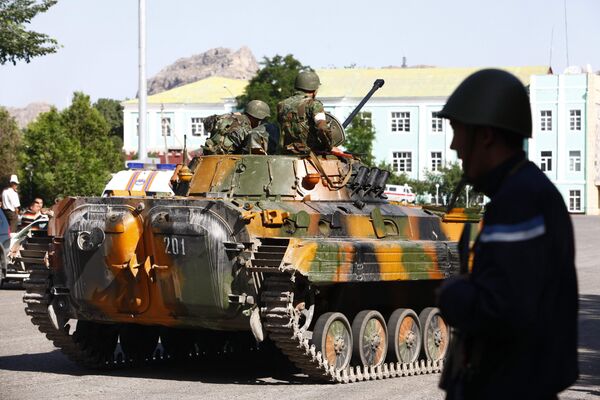In Kyrgyzstan, there are two versions of what caused the tragic events of June 10 and 11 in the city of Osh. According to the first version, spontaneous fighting between young Kyrgyz and Uzbeks evolved into a larger conflict in which stores and cars have been set on fire and a large number of injuries and deaths have occurred. The other version maintains that the riot was pre-planned and timed to coincide with the summit of the Shanghai Cooperation Organization in Tashkent. Both versions assign blame to local criminal organizations for the clashes in Kyrgyzstan's second largest city.
It is unlikely that the interim government was caught off guard by this turn of events. On June 5, the interim government's special envoy, General Ismail Isakov acknowledged that criminal activity is on the rise in the southern parts of the country. This was to be expected.
Whenever the government changes hands in Kyrgyzstan, there is always a rearrangement of influence in the criminal underworld. The March 2005 revolution triggered a major re-division of property in the south, in which the president's brother, Akhmat Bakiyev, seized control of legal and illegal businesses in the region, including the drug trade, according to sources within the secret services.
Artur Medetbekov, the former head of Kyrgyzstan's National Security Service, said in an interview with a Moscow-based magazine that Akhmat Bakiyev relied on local crime bosses to take control of one of the region's largest drug trafficking routes, passing through Tajikistan, Kyrgyzstan and Kazakhstan into Russia and on to Europe.
One crime boss, Aibek Mirsidikov (known as Black Aibek), is suspected of masterminding the May 19 conflict in Jalal-Abad. That was the first attempt to transform a struggle for influence between the interim government and Bakiyev's supporters into a larger interethnic conflict. Crowds hurled stones at the Kyrgyz-Uzbek Friendship University, where local Uzbek community leader Kadyrzhan Batyrov and his supporters had barricaded themselves.
A state of emergency was declared and a curfew was imposed, stabilizing the situation, but both were lifted on June 2, despite the fact that tensions remained high. Moreover, many suspected that Black Aibek was planning new riots, and there was a rumor that they would begin after June 7. But in the early hours of June 7, Black Aibek was killed.
Governor of the Jalal-Abad Region, Bektur Asanov, who was among the first officials to comment on the event, predicted the political repercussions of Black Aibek's death, saying that Bakiyev's followers had lost their criminal cover.
Crime and politics are so closely linked in Kyrgyzstan that it is hard to believe that spontaneous ethnic violence was the cause of the latest unrest.
An organized riot orchestrated by criminal leaders during the SCO summit sounds much more plausible. Interim President Roza Otunbayeva did not rule out the possibility on Tuesday: "Think about it. There is an SCO summit underway. What was the larger goal of the people who incited the violence?"
It's hard to say what their goals might be. Events can play out differently than planned when the organizers are trying to coordinate actions from behind the scenes. It is still too early to guess the true scale of the conflict. Fighting continues on the outskirts of Osh, and armed groups are attempting to break through the armored vehicles protecting the city.
Twenty years ago, Soviet interior troops had to be sent in to suppress riots in which hundreds of people were killed. Perhaps the organizers were counting on the same outcome this time. The recent violence in Jalal-Abad just happened to coincide with appeals from Belarus - where ousted president Bakiyev and his family fled - that the CSTO intervene in Kyrgyzstan. This was when the bold idea of sending troops to the conflict zone first began floating around. If this happened, it's easy to imagine how "out-of-control riots" could restore the "legitimacy" of President Bakiyev, to use the words of Belarusian leader Alexander Lukashenko.
Whatever their aims, the criminal masterminds perfectly timed the violence to coincide with the SCO summit. However, no surprises happened at the summit. During a news conference, President Dmitry Medvedev ruled out using CSTO forces to stabilize Kyrgyzstan at this stage, adding that the events in Osh must be thoroughly investigated.
Throughout the course of the summit, it became clear that none of the participants are willing to intervene in an internal conflict in Kyrgyzstan. A resolution was drafted and approved before the summit, which calls on SCO countries to send observers to the referendum on constitutional reform slated for June 27, indicating that the SCO has recognized the referendum as a way to legitimize the new Kyrgyz government.
The statements made by the presidents of Russia, Kazakhstan and Uzbekistan indicate that their attitude toward the interim Kyrgyz government remains unchanged.
No one knows what will happen in Kyrgyzstan. It is being torn apart by political conflict and violence. The number of political opponents of the interim government grows by the hour, and they are calling on voters to boycott the referendum. The future of the referendum is in jeopardy. No one knows what the outcome of the Osh conflict will be.
Even if the country is stabilized in time for the referendum, there is no guarantee that another conflict won't break out in a different part of the country, again delaying the emergence of a legitimate government. Kyrgyzstan is sinking into chaos, and the chances for a positive outcome are rapidly diminishing.
The opinions expressed in this article are the author's and do not necessarily represent those of RIA Novosti.
MOSCOW. (Sanobar Shermatova, member of the RIA Novosti Expert Council)

